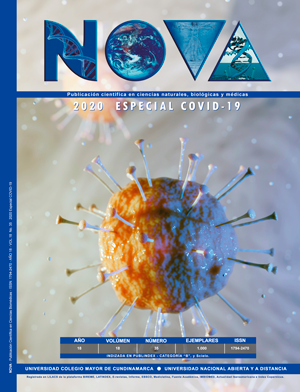NOVA por http://www.unicolmayor.edu.co/publicaciones/index.php/nova se distribuye bajo una licencia Reconocimiento No Comercial- Compartir igual
Así mismo, los autores mantienen sus derechos de propiedad intelectual sobre los artículos,
Declaración de privacidad.
Los nombres y las direcciones de correo electrónico introducidos en esta revista se usarán exclusivamente para los fines establecidos en ella y no se proporcionarán a terceros o para su uso con otros fines.
] Role of Rapid Tests (POCT) in the Diagnosis of SARS-VOC-2, Causal Agent of COVID-19
The gold test to detect SARS-CoV-2, the etiologic agent that leads to the pandemic of atypical pneumonia (COVID 2019) that first appeared in Wuhan City, Hubei Province of China in December 2019 (1), is the RT-qPCR. The standard protocol involves reverse transcription of SARS-CoV-2 RNA into complementary DNA strands (cDNA), followed by the amplification of cDNA specific regions, a procedure that takes several hours to complete and which results in the final information from the infection status can take up to 24 hours. For this reason, and due to the need to reduce the risk of possible viral spread within the population caused by the fast transmission of SARS-CoV-2, in order to prevent nosocomial spread and subsequent community transmission through the quick identification of suspected cases, and to predict the further infectious waves of viral recurrence, rapid laboratory methods or Point of Care Testing (POCT) are being developed
to reduce the diagnosis time and minimize the risk of contagion by the operators. These tests are discussed below.









